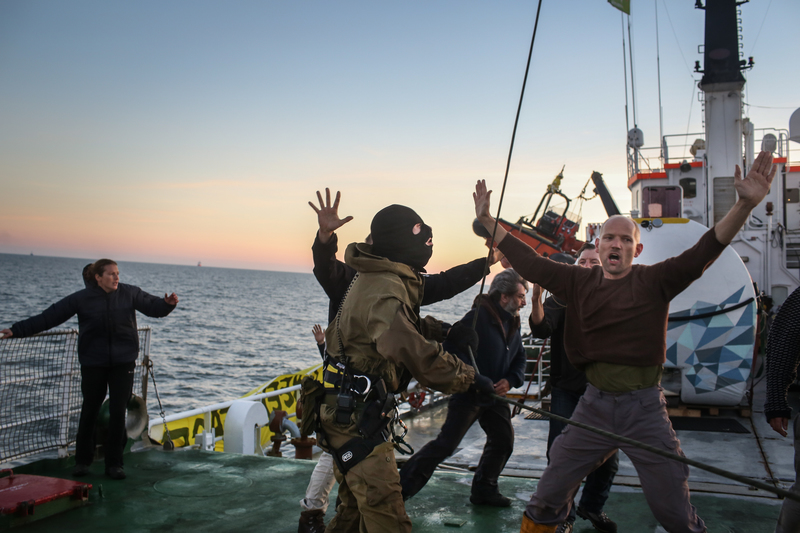Expert blog: “Obviously, they are not pirates” - the European Court on Human Rights rules in favour of Greenpeace activists in the Arctic Sunrise case
Ten years after Greenpeace activists were arrested and accused of piracy, the European Court of Human Rights has cleared them of the charges. Nottingham Law School PhD researcher, Laurence Teillet, explores the case.
By Helen Breese | Published on 19 July 2023
Categories: Press office; Research; Nottingham Law School;

This article commences with a touch of provocation, alluding to Russian President Vladimir Putin’s 2013 statements regarding Greenpeace activists following the Arctic Sunrise case: “Obviously, they are not pirates”.
In June, the European Court of Human Rights (ECHR) issued its ruling in the Bryan and Others v. Russia case, also known as the Arctic Sunrise case, which was connected to an incident involving Greenpeace ten years earlier. Obtaining a judgment from the ECHR is a time-consuming process, and it’s not surprising that it took ten years for the Arctic Sunrise case to reach a resolution. In order to bring a claim before the ECHR, claimants must first exhaust all available domestic legal avenues in their respective countries. This requirement means that environmental activists had to pursue their case through all levels of the Russian court system and remain dissatisfied with the outcome before they could escalate their claim to the ECHR.
In this case, a group of twenty-eight Greenpeace activists and two journalists travelled on a ship called the Arctic Sunrise, flying the Dutch flag, to the Pechora Sea. Their goal was to gain international support for creating a protected area around the North Pole and to ban offshore oil drilling and industrial fishing in Arctic waters. Their plan was to peacefully protest by climbing the Russian Prirazlomnaya oil drilling platform, located in the Russian exclusive economic zone (EEZ). They informed Gazprom, the platform’s operator, and the Russian coastguard about their intentions, stating that they would set up a survival capsule on the platform and remain there until Gazprom abandoned its plans for Arctic oil drilling.
On 18 September 2013, two activists managed to climb the platform, but they were forced back down by water cannons. They were then taken by the Russian coastguard to their ship, the Ladoga, while the rest of the activists returned to the Arctic Sunrise.

PhD researcher, Laurence Teillet, Nottingham Law School
On the evening of 19 September, armed Russian officials boarded the Arctic Sunrise from a helicopter and took control of the ship. They towed it to the port of Murmansk, where the crew members were detained and initially charged with piracy under Russian law. This accusation caused outrage in the media and among public officials. The Netherlands, as the country where the Arctic Sunrise was registered, protested the arrest and demanded the immediate release of the activists.
The piracy charges were not to be taken lightly. Normally, the country whose flag a ship flies has authority over it in the area known as the EEZ. However, an exception exists for cases of piracy. By accusing the Greenpeace activists of piracy, Russian officials were able to intervene, arrest them, and seize their ship. However, accusations of piracy carry serious legal consequences. Piracy, as defined by the United Nations Convention on the Law of the Sea (UNCLOS), involves illegal acts of violence committed on the high seas against another ship or aircraft for private purposes. Therefore, it requires that the act be illegal and involve violence.
However, Greenpeace activists strongly argued that the accusations against them were baseless. Their primary defence was that they were simply exercising their right to freedom of expression by engaging in peaceful protests. According to them, their actions were not illegal. They highlighted that their intention was to raise awareness and bring attention to environmental concerns, rather than engaging in any criminal activity. This is one of the reasons why they took the case to the ECHR, which issued its judgment a decade later.
Their arguments received significant public support even in 2013, which compelled Russia to revise the charges against them. Instead of piracy, the new charges were hooliganism. Russian President Vladimir Putin even publicly stated that the Greenpeace activists were clearly not pirates. This public support and change in charges were significant achievements for Greenpeace in this particular case.
However, it is worth noting that in the past, Greenpeace activists have not always been successful in avoiding piracy charges and garnering public support, hence the importance of the Arctic Sunrise case. For instance, in the 1986 Castle John case, Greenpeace activists were convicted of piracy by the Belgian Court of Cassation for a similar type of protest. However, surprisingly, the Court of Cassation ruled that “the plaintiffs used violence” and, thus, were considered pirates under Article 101 of UNCLOS.
Therefore, a valid question arose as to whether direct action taken by activists could potentially be categorised as piracy, based on the criteria of being illegal and involving sufficient violence. Considering the precedent, the legal debate surrounding piracy and the Arctic Sunrise case was justified. However, the ECHR finally intervened and clarified that Greenpeace’s actions were not illegal, as they were protected under the freedom of speech.
"In the present case, the applicants had notified the authorities in advance of their intention to hold a peaceful protest and the clearly stated goal of the protest was to draw public attention to the environmental effects of oil drilling and exploitation. The Court finds that, notwithstanding its disruptive character, such action should be considered an expression of opinion on a matter of significant social interest. In view of the above considerations, the Court concludes that the applicants’ complaint is compatible ratione materiae with Article 10 of the Convention [freedom of expression]."
This judgment by the ECHR reaffirms its previous legal rulings and holds immense importance as it establishes a legal basis to counter the wrongful application of the piracy label. It affirms that direct action, on the high seas, when the means employed are proportional to the desired outcomes, is not illegal.
This judgment eliminates the possibility of charging environmental activists with piracy, even when their actions are disruptive, as long as the means employed are proportional to the ends. As mentioned earlier, since environmental activism on the high seas is legally permissible thanks to this judgement, it cannot be categorised as piracy due to this requirement of illegality included in the UNCLOS definition. However, while it shields environmental activists from piracy prosecution for peaceful protests, it does not absolve them from all potential piracy charges if their actions escalate into disproportionately violent acts. If activists resort to “disruptive” methods within a confined geographical area and limited time frame to pursue political goals of “significant social interest”, it is deemed acceptable. However, engaging in violence and/or carrying out actions without clear geographical and temporal boundaries is not acceptable.
Consequently, not all instances of environmental activism on the high seas fall under the protection of this judgment. A notable example could be the case of Sea Shepherd, which was convicted of piracy in 2013 for perpetrating acts of violence against Japanese whalers. In this particular instance, the activists went beyond ‘mere’ disruptive methods and resorted to violent actions. They performed dangerous manoeuvres in close proximity to the whaling vessels and dropped damaging metal-reinforced ropes into the sea to harm the propellers of the Japanese ships. Given the nature of these actions, particularly within the challenging environment of the high seas, they would likely be viewed as acts of violence rather than mere disruption. Hence, while certain forms of environmental direct action on the high seas are now definitively safeguarded against piracy prosecution, this protection does not encompass extreme scenarios.
Consequently, Greenpeace activists involved in their latest campaign against Shell can find reassurance in knowing that they are not pirates, despite facing unwarranted accusations. Their actions are within the bounds of the law, protected, and aligned with “significant social interest”. However, Sea Shepherd, which is planning to resume its anti-whaling operations in the Southern Ocean, may face potential piracy charges if their actions transgress the boundaries of legality. Although the recent judgment offers protection to environmental activists engaging in lawful and proportionate actions, it does not grant them absolute immunity from prosecution if they stray into illegal territory.
Greenpeace activists are obviously not pirates, and this occurrence might be regarded as a unique and surprising event, as it represents a rare instance where the ECHR and President Putin have reached a similar conclusion.